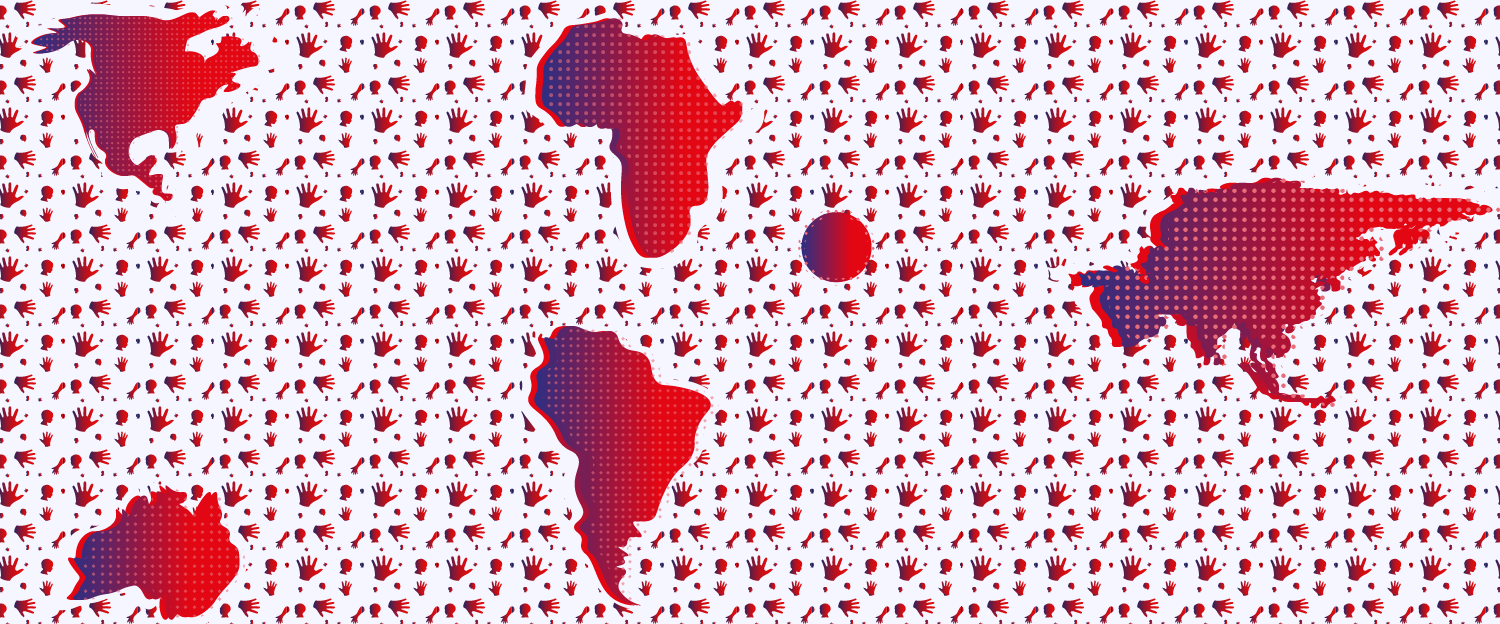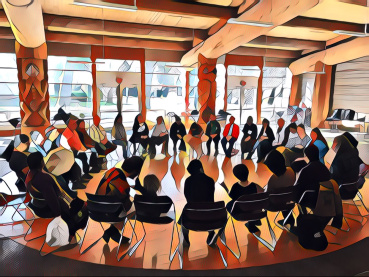As part of Black History Month 2020 I was invited to present on the concept of decolonising computing.
In offering an answer to the question of what it might mean to decolonise computing, I will begin by distinguishing my own approach from that of others, including those who participated in a workshop that convened in 2016 in the Department of Media, Culture, and Communication at New York University featuring scholars Simone Browne, Anita Say Chan, Lilly Irani, Lawrence Liang, and Jack Qiu (Chakravartty and Mills, 2018). Decolonising computing tends to be framed by such scholars in terms of exploring the kind of computing being done in the periphery / at the margins (or borders) of the modern/colonial world system informed by a praxis-based commitment to radical decentring. In this connection, Chan (2018) maintains that “decolonialists posed the significance of how cultivating a politics of decentralization – and a decentring of the self as expert and knowledge practitioner – might offer an affront to modernity’s domination and its politics of self-replication through the occupation of other epistemologies” (p. 2), referring to various Latin American inter-disciplinary network cultures characterised by “a de-centring politic, less concerned with a replication of its own ‘centres’” (p. 3). However, I remain somewhat undecided about the need to commit to decentring per se, being more concerned with decentring Eurocentrism cum West-centrism cum core-centrism. On my reading of ‘pluriversality’ as an alternative to Eurocentric universality, for example, it might be that a post-Eurocentric world might assume ‘poly-centric’ form, although I understand the latter somewhat differently to the way it is understood by Third-World Marxist theorist Samir Amin, who conceives it in essentially political economic terms.
Inspired by currents within Heideggerian phenomenology, Critical Race Theory (CRT) and decolonial thought, my own work in ‘decolonial computing’ (Ali, 2014, 2016) is informed by an attempt to “decolonially question concerning computing” asking whether computing needs to be decolonised, and if so, how such decolonisation should be effected. At the outset, it might appear somewhat of a stretch to describe computing as ‘colonial’ given that colonialism as a phenomenon tied up with imperial structures of domination and settlement is a thing of the past. In short, how can computing be colonial if the “age of empires” is over and we live in a postcolonial world?
Computing is a modern/colonial phenomenon.In my earlier attempts at explaining what I mean by ‘decolonial computing’, I argued that insofar as computing is a modern phenomenon, and modernity is founded upon and remains entangled with colonialism and its facilitating structural logics – what decolonial theorists refer to as ‘coloniality’ – then it might be that computing continues to bear the ‘legacy systemic’ traces of colonialism; in short, computing is a modern/colonial phenomenon. This applies to specific kinds of computing such as pervasive and ubiquitous computing – including more recent networked developments such as the Internet of Things (IoT) – which have been said to be driven by a “colonial impulse” (Dourish and Mainwaring, 2012), as well as computing more generally.
If this line of argument is sound, we can inquire along similar lines to that pursed by Chakravartty and Mills (2018), namely “If computing technology is the embodiment of rational calculation and a driver of twenty-first century capitalism, can it indeed be ‘decolonized’ – overhauled or appropriated for other ends?” (p. 2). While I think it is possible that computing can be dis-articulated (de-linked, decoupled etc.) from capitalism – or rather, racial capitalism since capitalism cannot be understood as separate from race/racism/racialisation in the context of the modern/colonial world system – and the initiatives explored by those scholars mentioned at the start of my answer provide concrete evidence of this, I am inclined to think that focusing on such peripheral/marginal/border developments, as important as they are, detracts from the necessity of “taking the war to the core”, by which I mean effecting the decolonisation of computing at its point of origin, hegemonic articulation (that is, dominant expression) and centrifugal (that is, expansionist) neo-colonial manifestation. For this reason, and as someone geopolitically located in the core, yet body-politically – and as a Muslim, theo-cum-ego-politically – marked as peripheral / ‘other’, I tend to focus my ‘disruptive’ efforts at interrogating mainstream computing. A principal concern is to engage critically with computing by exploring its ongoing expansive operation as a phenomenon informed and inflected by colonial logics with a view to thinking about the implications of such developments for, and from the vantage point of, those located at the margins (borders, periphery).
I think there is also a need to think about the desirability or otherwise of centring computing per se, irrespective of whether in its (racial) capitalist, postcolonial or decolonial forms...In this connection, I have previously suggested that practitioners and researchers adopting a decolonial computing perspective are required, at a minimum, to do the following: Firstly, consider their geopolitical and body-political orientation when designing, building, researching, or theorising about computing phenomena. Secondly, embrace the “decolonial option” as an ethic, attempting to think through what it might mean to design and build computing systems with and for those situated at the peripheries of the world system, informed by the ways of thinking and knowing (epistemologies) located at such sites, with a view to undermining the asymmetry of local- global power relationships, and effecting the decentring of Eurocentric/ Western-centric universals. However, to return to the original question, “what does it mean to decolonise computing?”, I think there is also a need to think about the desirability or otherwise of centring computing per se, irrespective of whether in its (racial) capitalist, postcolonial or decolonial forms; in my opinion there has been insufficient decolonial scrutiny, let alone decolonial interrogation, of the embrace of computerisation – latterly digitalisation and/or ‘datafication’ – which is something which I have begun to address in more recent work.
In this connection and building on earlier work sketching out the terrain of engagement with mainstream/core computing phenomena wherein I pointed to the scope of decolonial computing as extending beyond the critique of the IoT, pervasive and ubiquitous computing to include various other computing phenomena such as AI and robotics, I have attempted some preliminary decolonial computing interrogations of Internet governance and Big Data / datafication. In both contexts, my concern has been to unpack how the phenomena are discursively constructed vis-à-vis geopolitical, body-political and other issues.
With regards to Internet governance (Ali, 2018a), I have drawn attention to three matters that I suggest are ‘entangled’ with the issue of ‘alignment’ which I maintain constitutes a preeminent site for the operation of racialised coloniality:
- how Internet governance is discursively framed, by whom and for what purposes. My concern is to explicate, through close, decolonial reading, the tacit, yet possibly unintentional, operation of colonial logics in certain views about Internet governance articulated by mainstream and dominant voices geopolitically located in the Global North and body-politically marked as white
- the relation of prior, extant long durée network formations – social, political, economic, technological, cultural, etc. – to emerging socio-technical networks such as the Internet, web and social media vis-à-vis reproduction of world systemic power-relations
- the persistent yet masked illiberalism of Western conceptions of liberal political and economic order under colonial modernity.
Underlying this project is a concern to disclose what might be described as the operation of a tacit ‘racialised colonial governmentality’ within hegemonic (that is, dominant mainstream) Internet governance discourse with a view to preparing the ground for the decolonisation of Internet governance per se; in addition, there is a normative (political, ethical) commitment to the forging of an Internet governance of, by and for the Global South rather than one framed in terms of the possibilities of ‘inclusion’ into an extant, incursive, hegemonically ‘Northern’ (that is, ‘Western’, West-centric, etc.) system ‘masked’, intentionally or otherwise, through advocacy of multi-stakeholder approaches.
With regards to datafication (Ali, 2018b), I have attempted what might be described as a decolonial ‘meta-discursive’ critique of critical data studies discourse. In this connection, my concern has been to show how the concrete historical-geographical phenomenon of European colonisation of the non-European periphery (margins, borders) of the modern/colonial world system has been appropriated as a metaphor in the context of ostensibly ‘critical’ discourses associated with the rise of Big Data and what some commentators refer to as ‘surveillance capitalism’. On my reading, such discursive moves should be seen as enacting (neo-)colonial violence insofar as they are appropriative and Eurocentric/West-centric/core-centric in tending to re-centre Global North concerns while framing them in terms of the violence historically meted out, and perpetuated, by the Global North (coloniser) on Global South (colonised) populations.





Rate and Review
Rate this video
Review this video
Log into OpenLearn to leave reviews and join in the conversation.
Video reviews